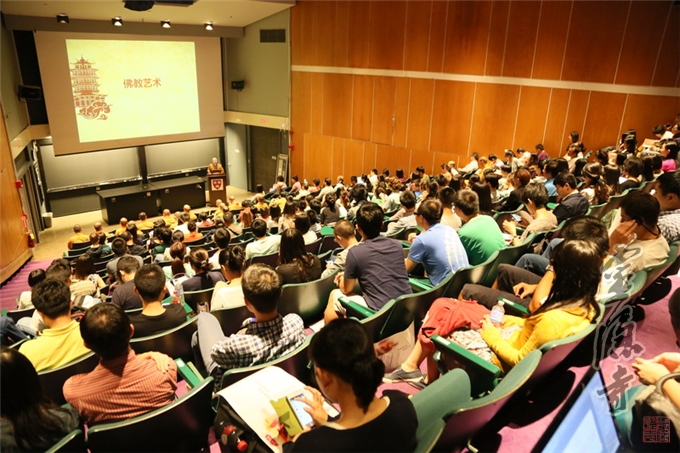Cambridge, Mass., Sept. 4, 2013, –Lingyin Abbot Venerable Guangquan accompanied by more than 30 monks, guests of China Buddhism Association, arrived in the United States for cultural exchange with local Buddhist communities. There he gave a talk entitled “Buddhist Art and World Peace” at Harvard University Science Center, making him the first Lingyin venerable that promotes Buddhist culture at a podium of an American university. Lingyin is one of the oldest Buddhist temples in China and has a history of more than 1600 years.

|
|
Professor James Robson from Department of East Asian Languages and Civilizations gave the welcoming speech to Venerable Guangquan and his group on behalf of Harvard University, during which he pointed out that the Chinese name of Harvard University, ”Hafo”, has the character “Fo”(Buddha) in it, indicating the destined connection between Buddhism and the University; and that it was a fortunate and unusual opportunity for the University to have Venerable Guangquan, Abbot of the famous historical Lingyin Temple in China, as its speaker. |
During the two-hour speech, Venerable Guangquan demonstrated, with assistance of visual aids and simultaneous interpretation, the development and changes of Buddhism during its transmission as well as the incredibly beautiful Buddhist arts which are results of the fusion between Buddhist and local cultures. He elaborated on the idea of harmony which is prevalent in both Buddhism and traditional Chinese culture, and its practical significance in solving conflicts between religions and cultures. One of the early founders of Lingyin Temple, Master Yongming Yanshou, for instance, proposed the idea of “the shared ultimate goal of all the good”, advocating that different religions should tolerate and integrate with each other, as they all have the same ultimate goal of guiding societal morality and purifying people’s souls.
|
|
Venerable Guangquan was requested by the audience to comment on the threat of attack on Syria by the United States. Venerable Guangquan responded by saying that Buddhism encourages mercy and is opposed to killing, and that neither side of the war should have used chemical weapons, nor should the United States intervene in the Syrian issue using military force, as war only plunges people in the abyss of misery, and that it is the civilians that suffer most in violence and killing. |
Yan Yan, student of Mary Baldwin College who came all the way to Harvard, described Venerable Guangquan’s talk as “a conversation between Buddhist arts and world peace, and a fusion of eastern and western civilizations”.
According to the plan, Venerable Guangquan and his group will give two more talks and a Lingyin-style tea ceremony in New York, so as to demonstrate and promote the vast and complex Chinese Buddhism culture to the general public of the United States.